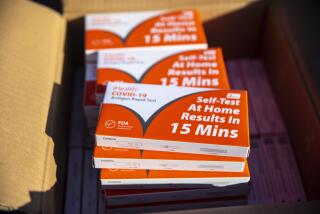No Holding Back as Public Opts for PCs Over Privacy
Hundreds of thousands of people flooded the Web site for Free-PC.com Monday to sign up for one of the first 10,000 computers the Pasadena company said it would give away to people who are willing to share personal information and receive targeted advertisements.
The Web site was visited by an estimated 300,000 people by midafternoon, with nearly all of them filling out the online application for the fully equipped PCs made by Compaq Computer, said Free-PC.com spokesman Steve Chadima.
For every person who got through, there were untold others who tried in vain to connect to the Web site, at https://www.free-pc.com. Chadima said the company is adding server capacity to its site “as fast as possible.”
The demand demonstrates that a large segment of the public is willing to exchange some of their privacy for a free computer. Free-PC.com founder Bill Gross said the company needs to collect personal information from its customers--including what sites they visit on the Internet--so that it can make enough money from advertising revenues to recoup the cost of the computers and earn a profit.
Janis Carroll, a shop steward for the Service Employees International Union in Los Angeles, said she didn’t think questions on the application were particularly intrusive.
“It’s just name, address, work number, home number, how many people live in the house, what is your income, what are you interested in, what type of magazines do you subscribe to,” Carroll said.
With so many people willing to share so much personal information, the company dropped its initial plans to make the first 10,000 computers available on a first-come, first-served basis. Instead Free-PC.com will collect applications over the next two months and give the first 10,000 PCs to applicants whose demographic profile most appeals to advertisers.
“Those 10,000 units are going to get passed out to the 10,000 people who are the best match to what the first advertisers want,” Chadima said.
Gross has said he plans to target low- and middle-income households that can’t afford to buy a computer--although some have questioned whether advertisers are as eager to reach them as they are to reach people with more disposable income. But Free-PC.com executives and outside analysts said advertisers would be eager to reach moderate-income consumers online once they have access to the Internet.
Free-PC.com ultimately plans to give away as many as 1 million computers, and if the company’s business model works, others--such as America Online--are expected to follow suit.
Since Free-PC hasn’t yet announced its initial advertisers, it is unclear which demographic profiles will be selected for the first 10,000 PCs.
Some potential customers who were initially enthusiastic about Free-PC.com said they had second thoughts after trying--and repeatedly failing--to connect to the company’s Web site.
“That’s pretty bad for the first day for it to crash like that,” said Ted Reiner, a retired aerospace worker and part-time telemarketer in Chatsworth. “I thought, ‘Wait a minute, is this for real?’ ”
Others said they were still skeptical about the privacy ramifications of allowing a company to monitor their computer use.
Edward Hawthorne, who retired from the Los Angeles Police Department and lives in View Park, said he was particularly concerned about whether Free-PC.com could honor its pledge to keep the customer information it collects to itself. “You never know what company would buy this company out, and you never know exactly what they would do with that information,” he said.
Gross officially unveiled Free-PC.com at the Demo 99 conference in Indian Wells and announced that USA Networks--a partner in another Gross-founded company, Ticketmaster Online-CitySearch--has invested $10 million in his newest start-up.






